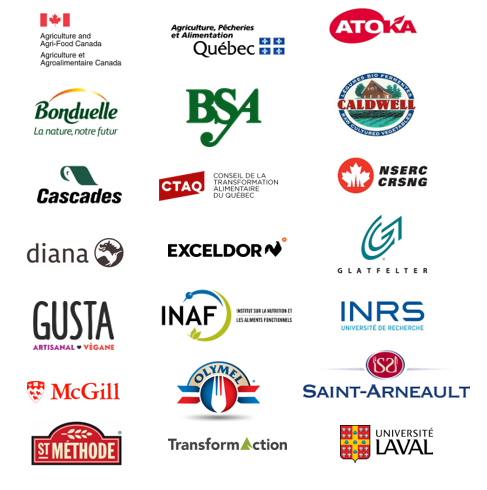
Lifespan of natural products and ingredients
The first pre-competitive McGill-CTAQ was created by the initiative of McGill University’s Faculty of Agricultural and Environmental Sciences in close collaboration with the Quebec Counsel for Food Transformation (CTAQ). This initiative promotes industrial innovation through the development of research projects that respond to the priorities and needs of Quebec’s food processing sector, thus helping to improve its overall competitiveness.
In the short term, this initiative has focused on establishing pre-competitive projects to develop approaches based on the use of natural ingredients that are economically viable. Improving the lifespan of food, which is more acceptable to consumers, is part of the “clean label” trend and is a very important issue for the agri-food industry.
The network benefited from the active participation of thirteen companies and seven institutions. While research and development activities in the form of pre-competitive and collaborative projects with industry were completed in 2018-19, technology transfer, the publication of research results and the training of highly qualified professionals have continued to date. A total of 12 theses (two doctoral theses and 10 master’s theses in science) were published through the network, as well as at least 10 scientific research papers (published or in preparation). More than 47 students and highly qualified staff actively participated in this first network.
Research Activities
Activity 1 - Development of a mapping of natural ingredients
Natural ingredients were examined for their antioxidant and antimicrobial effect. By combining the principle components (quantified) of the natural ingredients with data found through experimental analysis, maps and predictive models were developed to target specific needs. The mapping is useful for determining complimentary interactive effects of the ingredients. The analysis of the data allowed for the development of naturel/multi-ingredient formulations for food preservation specific to different food models. These formulations underwent sensory evaluations to determine their suitability for each food.
Activity 2 - Development of active packaging based on natural extracts and oils of a Canadian origin
The development of active antimicrobial packaging by integrating natural compounds and extracts derived from Canadian sources into material currently used by industry. This technology aimed to improve the quality and shelf-life of meat products, vegetables as well as packaged bakery products.
Activity 3 - Evaluation of the efficiency of a gaseous ozone treatment for the shelf-life extension of specific food products
This project involved the development and optimization of ozone for the sanitation of fresh and frozen vegetables, chicken and sausage to improve food safety and to extend shelf-life. The influence of surface characteristics and humidity on the effectiveness of the treatment with ozone gas to control foodborne pathogens were evaluated. To confirm the suitability of ozone gas treatment on the select food products, various sensory and texture attributes were measured.
Activity 4 - Evaluation of the efficiency of pulsed light to reduce microbial contamination on fruits, vegetables and meat
Optimized procedures were developed for the use of pulsed light against microbial contamination of fruits, vegetables and chicken. The project examined the effectiveness of pulsed light treatments on microbial load reduction, on enzymatic inactivation and antioxidant enrichment. This treatment was compared against standard chemical disinfection methods.
Partners
The network relies on the expertise of all of it's partners, industrial and academic. The current partners of the network are:

